How To Retain Your Data If Your Cloud Provider Goes Under


|
|
How To Retain Your Data If Your Cloud Provider Goes Under The cloud computing industry is booming. Many established companies have already made the transition to the cloud, and most new startups use some type of cloud computing. Cloud computing is used in practically every industry from healthcare to government to gaming. But there is a new trend going on, and unfortunately it is not a positive trend. Cloud providers are going out of business at an alarming rate. Even worse, in most cases those cloud providers do not have an adequate plan that allows customers to retain their data from the cloud provider.
0 Comments
A Cloud Guide: The Benefits Of Cloud Computing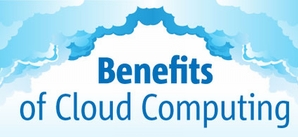 The acceleration of cloud computing has brought a variety of changes to many different industries. There are concerns of course, as many large companies and enterprises are hesitant to give up paper and move their company into the digital realm. Often, this hesitation concerns money or security and sometimes it's just the thought of such a big change in the way a company performs its business. Others worry about the impact of cloud computing on the IT department. However, these concerns have been largely overblown. The benefits of cloud computing are too big to ignore and we are going to look at some of the top benefits of cloud computing. Cloud computing saves time and money One of the many misconceptions that people have about the cloud is that it will cost more time and money to transfer all files and documents to the cloud. Moving documents to the cloud is a fast process. Any files and documents that are already in digital format can simply be uploaded to the cloud storage account. To transfer paper files to the cloud simply consists of scanning paper documents to a computer file and then uploading them to the cloud storage account. It saves money as the company will require a smaller IT staff and small businesses may actually only need an IT consultant they can call when needed. It will vastly lessen the costs of buying new hardware, upgrading hardware, maintaining hardware and purchasing additional storage space. It saves on physical storage space as all files will be stored in the cloud. No bulky file cabinets or storage rooms are needed. All upgrades and maintenance are performed by the cloud storage provider. Paper and printing costs will be eliminated or vastly reduced. Cloud computing brings efficiency with BYOD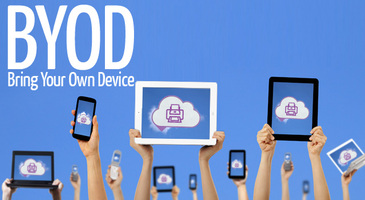 Cloud computing has brought us the BYOD (Bring Your Own Device) movement. With BYOD, companies allow their employees to perform company work and access company files on their personal devices, such as smartphones and tablets. One of the main benefits of BYOD is that many employees can work remotely and no longer need to make costly and time-consuming trips to and from the office every day. While security has been a concern in this movement, IT departments have implemented monitoring software in the personal devices to ensure that company data is not being abused. However, users are not particularly fond of this intrusion as their personal text messages and photos could possibly be read during the monitoring process. To combat this, many employees have begun carrying two phones, one for personal and one for work. However, this is not very efficient or cost-effective. Because of the BYOD movement, Samsung implemented Knox Security into the Samsung S4, a trend that's sure to take off among other phone manufacturers. This added security feature enables the phone to be split into two separate sections- one for personal use and one for business use. This means that all company data remains secured in the business section while personal SMS messages, photos and other data remains free from the IT department's security monitoring. Cloud Computing offers easier sharing and searching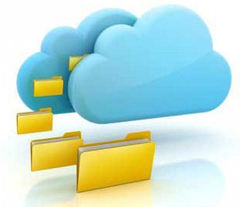 Sharing files is made simple with cloud computing as files can be shared among multiple users by simply dragging and dropping files or documents into a shared folder. Once a file is dropped into a shared folder, it is then uploaded to the cloud storage provider's servers and sent out to all users that have the shared folder installed on their computer or device. Cloud computing makes searching for files and folders a quick and simple process. Forget searching through huge storerooms with thousands of folders, all files within a cloud storage account can be searched within seconds. There are even apps such as CloudMagic that allow users to search across many different cloud services. This works well if your company is using multiple cloud storage providers such as Google Drive, SkyDrive, Dropbox and more. Cloud computing provides stronger security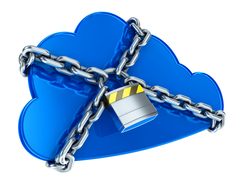 This is one of the largest misconceptions about the cloud. Many people feel that the cloud does not offer adequate security of company data. With the strong security features that cloud storage providers offer, the strength of cloud security is up to the user. Strong passwords and the use of additional security measures such as two-factor authentication help keep data secure. All competent cloud storage providers use strong encryption during transfer and storage of data. Cloud security has become advanced enough that the U.S. Defense Department is moving to the cloud. Cloud computing offers complete security from natural disasters such as fire, flood, hurricanes, tornadoes, etc. If a company's physical location is destroyed by a natural disaster, all company files and folders remain intact, safely stored away in cloud servers. And if you’re worried about the cloud storage servers getting hit by a natural disaster, there are cloud storage backup services such as cloudHQ, which provides a continuous backup of all data. It can even sync files across a variety of cloud storage providers. The cloud is here to stay Increasing cloud and mobile trends are showing us that cloud computing is not going away. Mobile use is expected to overtake desktop computer use within the next year or so. The benefits of cloud computing include cost-reduction, time-management, easier and more efficient business performance and productivity, and better security. With benefits such as these, the cloud has already become too big to ignore. Related articles
CloudMagic - How To Search The Entire Cloud If you're like me, you probably have data spread across a number of cloud storage services such as Dropbox, Box, Google Drive, etc. Hopefully you're a lot more organized with your data than I am with mine, because at times I do find myself utilizing the search function of the cloud service. Many of us use cloudHQ as a way to sync all of our data from various cloud services into one cloud backup account, which also allows easy searching because all of our files are backed up to one centralized service which can be easily searched. CloudMagic can search across many devices, including email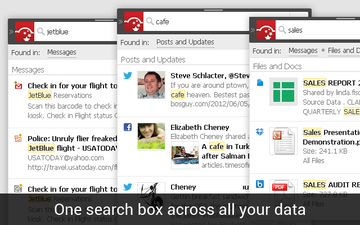 But maybe you don't use cloudHQ and perhaps all of your data is spread out over many different services. If you want to be able to search all of your files from a large number of cloud services, you may want to check out CloudMagic. CloudMagic allows users to search files stored in Gmail and Google apps, Google Drive, Twitter, Facebook, Dropbox, SkyDrive, Evernote, Box, Microsoft Exchange, Office 365, Hotmail, Outlook.com, MSN, Windows Live, Yahoo, iCloud, GMX, AOL and Mail.com. Multiple accounts of any of these services can be used as well. Any data stored with CloudMagic is kept on Amazon Web Services (AWS). All concerns about privacy or security of data and information are addressed in the Privacy Policy. How to use CloudMagic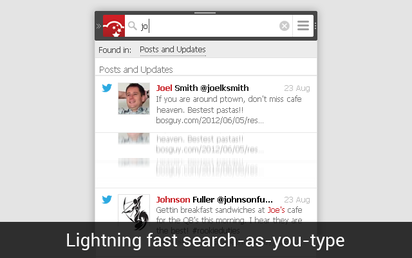 Simple searches can be performed using a person's name, a company name, a phrase you remember from a tweet, etc. For a more advanced search, you can use Operators. CloudMagic offers a free plan which allows users 50 views per month. One view is described as clicking on a search result, which gives you an instant preview of your data. If you need more than 50 views, CloudMagic offers a premium plan which is currently only $4.99 per month for unlimited views. CloudMagic offers apps for Android, iOS, Kindle Fire, Windows Phone and Windows 8. It also offers browser extensions for Chrome, Firefox, Safari and IE. Keep up with CloudMagic on Twitter and Facebook. CloudMagic offers an excellent service which covers a wide range of services. Sign up for the free plan so you can try it out and upgrade later if necessary. Related articles
Samsung Galaxy S4: The Ultimate Business SmartphoneKnox Security Improves BYOD Usage With Samsung Galaxy S4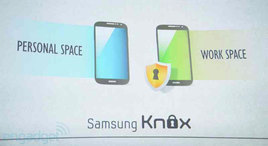 With the rapid expansion of the Bring your own Device (BYOD) movement among companies and enterprises, mobile security has become a concern, and an issue that many companies aren't quite sure how to deal with. The benefits of BYOD are far too great to ignore completely, yet when you have company data that is accessible from employees' private mobile devices, some concessions must be made. To battle the insecurity issue, many IT departments require monitoring of the mobile devices that will be used to access company data. So now the concern is with the employees because they don't want the company monitoring their private emails and data. The solution for many employees has been to carry two phones- one for personal use and one for business use. This way, the employees' private data stays private while the company phone is monitored. Knox: Samsung's new business and security solution Samsung and Absolute Software have been working in together to create a security solution called Samsung Knox. This security platform transforms the Samsung Galaxy S4 into the ultimate corporate phone. It separates the phone into two sections- one for personal use and one for business use. This ensures that all personal data stays private from remote business users so the IT guys can monitor the business usage of the phone without prying into private emails or data. The Knox security feature could change the way BYOD is currently used as it now provides access for employees to use a single phone for both personal and corporate use. With the exciting array of features that the Samsung Galaxy S4 already comes with, the implementation of such an innovative business and security solution makes the phone the ultimate business smartphone. Related articles
Top 4 Misconceptions About The Cloud If you listen to all the recent media chatter, you will see a picture that paints a grim outlook on the cloud. You may hear horror stories of how unsecure the cloud is, how data can get easily lost and how security breaches mean that the cloud should not be used to store any data, much less personal data. Well, these are opinions based on a few occurrences and the truth is, most of these security breaches and data losses occurred because of user error or lax security. The spread of misinformation by the media has caused some concern, as well there should be some concern. Security is not something to be taken lightly, especially if you have sensitive or confidential data stored in the cloud. Hopefully, some of these incidents will cause individuals and companies to wake up and implement the strongest security measures that are possibly available. Here are some of the top misconceptions that have been spread by the media that may have you doubting that the cloud is the correct choice for you or your company. Top 4 misconceptions the media has told you about the cloud Not Secure: The media has pounced and taken advantage of some recent security breaches and turned it around to make people believe the cloud is not secure. The truth is, if users were more security conscious and used better authentication measures, such breaches would not occur. There is a reason that "password" is still the most used password in the world today. People do not think that they are targets, so why should they worry about security? Many hackers target people at random, just for fun. Some target people for monetary reasons, some to make political or other statements and some are targeted out of revenge. There is a host of reasons why people get targeted, but most of them never see it coming. Weak passwords and security challenge questions can be easily guessed or hacked. Many cloud services offer extra security that many users just don't implement, such as two-factor authentication. Two-factor authentication is a method that allows users to input their password, at which time a code is sent to the user's mobile phone. The user then enters this code, and they have access to the account. This protects much better as a hacker must have access to both your password and your mobile phone in order to access the account. So even if your laptop gets stolen, and your password was saved on it, your data remains secure as long as the hacker does not have your mobile phone. All extra security measures such as two-factor authentication should be implemented. The minor delay in accessing your account is very minuscule when compared to a security breach that could include data loss. Complexity: While it is true that the cloud makes things a little harder on the IT department, the temporary hassle is worth it because it makes the cloud so simple to use. Once the IT guys have created all the security protocols for a secure data flow, the cloud can be used by practically anyone with no training necessary. If company data is to be accessed on mobile devices, these employees may need to be given specific instructions on how to correctly protect company data on mobile devices, but other than that, it's simple to use, not complex at all. Useless without internet: This isn't exactly true either. Depending on what cloud providers you use, data is usually accessible offline. So documents, spreadsheets and presentations can all be worked on offline. Then, when you reach an area where internet is available again, the data will sync online with the cloud. Also, in the case where a cloud provider's server goes down for maintenance or other reasons, it's advisable to have a secure backup plan in place with another provider. There are many third-party cloud backup services, such as cloudHQ, that provide a continuous replication of all data from one cloud provider to another. This ensures that if the server goes down for a bit, your work continues uninterrupted, while it also provides a secure backup that protects against data loss. Expensive: This misconception couldn't be further from the truth. Utilizing the cloud means you can do away with most expensive hardware around the office. You can reduce your costs as you will not have the expense of buying, upgrading and maintaining hardware, storage space and servers. The cloud will take care of all of that. Those big, bulky file cabinets that take up so much room can be tossed in the scrap metal bin. With everything stored in the cloud, the cloud storage provider will take care of everything. Also, with data accessible by mobile devices, employees can do their work from anywhere. They don't have to make costly and time-consuming trips to and from the office and can instead concentrate more on actual work instead of commute and other non-efficient problems. The media's misrepresentation of cloud computing may have you worried about cloud security. It's good to be concerned and aware, but to panic and be afraid is just absurd. With the proper security measures in place and strong authentication, the cloud can be enjoyed in an easy and simple environment while remaining secure and keeping your data protected and safe. Thousands of companies make the move to the cloud every day. Others do their best to block access to the cloud. But one thing is certain- the cloud is the future. It's best to embrace it now and grow with it, as it opens up possibilities never seen before. Just don't let an uninformed media source ruin your thunder with misrepresentation of facts. Related articles
|
Cloud Tech WireCloud technology blog covering cloud services and the technology that powers them. Archives
August 2017
Categories
All
|